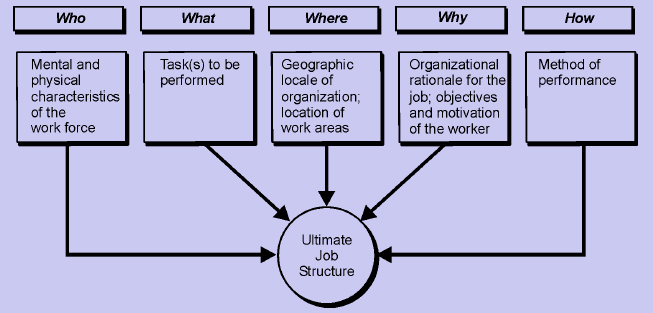Job Design Fundamentals
Job design is the process of determining the specific tasks and responsibilities to be carried out by each worker in the organization. It encompasses the specifications and expectations of an employee's work-related activities, including the structural and interpersonal aspects of the job. It describes a decision on issues like who is to perform what job, where it is to be performed, and how it is to be performed. Figure 7.1 illustrates the various factors to be considered in job design.
A job is more than a list of tasks that a worker has to carry out on a regular basis. Managers have to plan it carefully, taking into consideration the needs of the employee as well as the employer. They need to design jobs with an objective of motivating all the employees to perform in their work with commitment and enthusiasm. Generally, the emphasis is laid on developing jobs that get the necessary work done, but they should also contain more elements that workers like and fewer elements that they dislike, in respect of the job.
An effective job design ensures that jobs are consistent with the organization's goals. The objective is to boost employee motivation to achieve performance standards, and to match the skills and abilities of each worker with the job requirements. One of the most prominent job design models known as Job Characteristics Model was developed by Richard Hackman and Greg Oldham. It lists five key job characteristics, which motivate a worker. These characteristics are skill variety, task identity, task significance, autonomy and feedback.
Skill variety indicates the level and range of skills, abilities and talents needed to perform a job. Task identity defines clearly the identifiable tasks needed to complete the main task. Task significance indicates the influence of the job on individuals inside and outside the organization. Autonomy of a job indicates the flexibility, independence and discretion that is available to the employee in performing the job. Feedback indicates the level of information given back to the employee regarding his/her performance.

Email based Operations Management assignment help - homework help at Expertsmind
Are you searching Operations Management expert for help with Job Design Fundamentals questions? Job Design Fundamentals topic is not easier to learn without external help? We at www.expertsmind.com offer finest service of Operations Management assignment help and Operations Management homework help. Live tutors are available for 24x7 hours helping students in their Job Design Fundamentals related problems. We provide step by step Job Design Fundamentals question's answers with 100% plagiarism free content. We prepare quality content and notes for Job Design Fundamentals topic under Operations Management theory and study material. These are avail for subscribed users and they can get advantages anytime.
Why Expertsmind for assignment help
- Higher degree holder and experienced experts network
- Punctuality and responsibility of work
- Quality solution with 100% plagiarism free answers
- Time on Delivery
- Privacy of information and details
- Excellence in solving Operations Management questions in excels and word format.
- Best tutoring assistance 24x7 hours